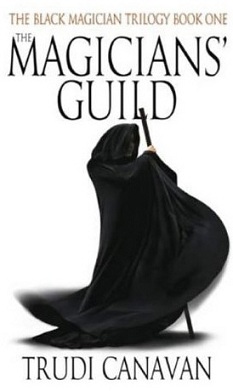
The Magician’s Guild
Trudi Canavan
465 pages
published in 2001
Trudi Canavan is an Austrialian fantasy writer who has been mostly writing epic fantasy trilogies and has become rather popular as a result. According to Wikipedia, her first series, The Black Magician Trilogy was ” the most successful debut fantasy series of the last 10 years”. The Magician’s Guildin the first book in that series as well as her debut novel, which I didn’t know when I picked it from the library to read. It was just that this was the only of her novels available that wasn’t part two or three of a trilogy when I decided to try and see if I would like her writing.
What also made me pick up this book in particular when skipping past seemingly similar fantasy books by other writers was the backcover blurb, which made it sounds like it was something more than the usual fantasy cliches in the usual medievaloid setting:
Each year the magicians of Imardin gather to purge the city streets of vagrants, urchins and miscreants. Masters of the disciplines of magic, they know nobody can oppose them. But their protective shield is not as impenetrable as they believe.
That sounds remarkably like The Magician’s Guild has a bit of class consciousness built into its story. That maybe the plucky street girl who discovers she can break the magicians’ shields could oppose the old order and win freedom and respect for the people from the slums, from outside the walls. And to be honest, the first dozen or pages or so, seen from Sonea’s point of view, did seem to confirm this impression. We’re told about how she and her aunt and uncle, along with hundreds of others were kicked out of the rented rooms they had won for themselves through hard work, on orders of the king, we’re shown an example of how the rich burghers of the city look down upon the slum dwellers, how dangerous the city guards are and finally, how the magicians cleanse the streets each year, sweeping all the unwanted people out of the city beyond the walls, with hundreds of people hurt, wounded or killed in the process. It all sets the stage nicely for a bit of agitprop. Sadly, this setup is soon abandoned.
Instead we get a much more traditional story of the young outsider who discovers they can do magic, who has to be convinced both of her own powers and the need to safely learn to use them under the tutilage of the magician’s guild. Untrained magicians burn out, can’t control their powers, so it’s for her own interest that they try to hunt Sonea down. Two of the magicians leading the search, Lords Dannyl and Rothen, have her best interests at heart; the third, Lord Fergun — the one she actually hit with her rock — hasn’t. The broader conflict inherent in the city’s class structures, the fact that there’s a whole class of people, dwells, barely tolerated for their labour in Imardin, but expelled as soon as they’re deemed to be trouble, is ignored in favour of a much simpler story about good and bad magicians.
To be fair, late in the plot some reference is made to the unfairness of Imardin’s social situation, with the idea that having a dwell like Sonea in the magicians’ guild would be a good thing, that Sonea becoming a magician means she would have the power to change her people’s lot, but we know how well that always works out in real life… Meanwhile it doesn’t help that Sonea is a fairly passive character, first spending much of the book depending on others to hide her from the magicians, then going through the inevitable introduction to the magician school. At first she’s hostile to the idea of becoming a mage, but in the end she of course finds a reason to stay, setting things up for the sequel. Once the story sets into this familiar pattern, there are few surprises.
This doesn’t mean that The Magician’s Guild is necessarily badly written. The plot is predictable and the social structures of Cananavan’s world in the end are as conservative and resistant to change as the most cliche of medievaloid extruded fantasy product, but Cananavan is a pleasant enough writer and the story itself flows along nicely. And though the gender relations are as conservative as the class relations, there is remarkable little open sexism. If you’re just looking for light entertainment, this fits the bill, but sadly it’s nothing more than that.
Canavan, Trudi: The Magician’s Guild (Black Magician I) (2001) | humanitysdarkerside
November 3, 2013 at 7:08 pm[…] Martin’s Booklog […]